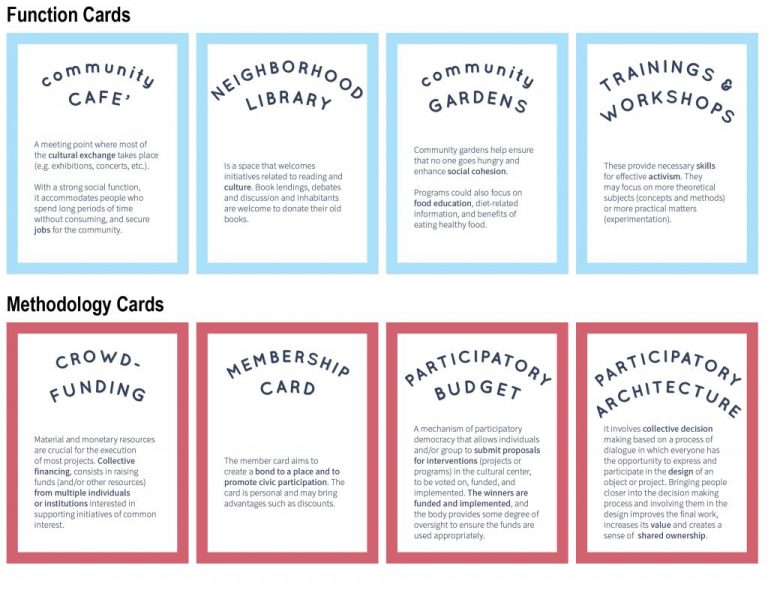Subscribe to our joint NEWSLETTER for
EUTROPIAN &
COOPERATIVE CITY MAGAZINE

The project was initially developed as an exchange project, but due to the travel restrictions and limitations posed by the current pandemic, it had to be moved online.
Over a series of interactive online sessions, Eutropian experts provided a transfer of know-how and a summary of good practices. The examples focused on successful cooperation between public authorities and other relevant local stakeholders such as scholars, communities and local businesses. Project experts presented best-practice examples of Urban Commons use around Europe and proposed alternative solutions on how urban-civic partnerships can be built to last.

This is an important question, the answers to which Eutropian has actively been exploring and researching for many years. Although numerous current examples serve as models of establishing Urban Commons, many communities still struggle with sustainably managing and funding such projects. Durrës, the second largest city in Albania, is in a similar situation. That’s why this project focused on finding a new approach for Urban Commons in Durrës Municipality.
Durrës is a city with numerous old and unused vacant buildings that could serve as suitable sites for reuse and repurposing. The project was based on three basic questions that arose during the initial discussions:
As stated previously, the original plan was to visit Durrës with our experts. The visit would ensure an exchange and help the experts gather information and make sense of the region, the local stakeholders involved and the situation on the ground.
Of course, due to the COVID-19 pandemic, this plan became difficult to implement. We quickly came up with an alternative and moved the whole project online.
Adapting this new approach had its pros and cons, and we had to explore new methods and modes of exchange, while developing an interactive and engaging workflow to serve as a substitute for real-life interaction.
The first step was to introduce the stakeholders and experts, and promote an exchange of information as well as engagement. To ensure comprehensive exchange, a total of four online meetings were held.
Click on the video links below to view the workshops in their entirety, including the fourth session focused on using interactive games to create commons strategies and concepts:
Workshops thrive on interactivity and fostering face-to-face exchange among participants. Moving workshops online poses major challenges and risks. If not orchestrated properly, they run the risk of transforming into tiresome and unnecessarily long lectures, lacking real exchange and participation.
To prevent this from happening, Eutropian’s gamification experts developed a customized virtual board game in which local stakeholders, as well as participants from Eutropian took part.
The objective of the game was inspired by the existing commons options in Durrës: to transform a fictitious empty factory building into a community space through community participation. Miro was chosen as the platform to host the board game and provide interactivity. Participants had to cooperate in finding a common ground via a 4 step process:


Cooperate: The next step in the game sees all players presenting their selected cards to the group. Following this step, only 5 of all presented cards are chosen by the group to help generate a discussion around the selected concepts and methods. These 5 cards are to represent the co-designing process for the vacant building.
Advocate: In the last step, a player is selected to summarize the finalized project, togeth4r with the creation process and new functionalities. An open discussion ensues, evaluating the concept’s coherence and effectiveness.
Download the project publication for more information and a detailed description of the game.
For more information on the project, don’t be shy, reach out to project expert Yilmaz Vurucu.

| Cookie | Duration | Description |
|---|---|---|
| cookielawinfo-checkbox-analytics | 11 months | This cookie is set by GDPR Cookie Consent plugin. The cookie is used to store the user consent for the cookies in the category "Analytics". |
| cookielawinfo-checkbox-functional | 11 months | The cookie is set by GDPR cookie consent to record the user consent for the cookies in the category "Functional". |
| cookielawinfo-checkbox-necessary | 11 months | This cookie is set by GDPR Cookie Consent plugin. The cookies is used to store the user consent for the cookies in the category "Necessary". |
| cookielawinfo-checkbox-others | 11 months | This cookie is set by GDPR Cookie Consent plugin. The cookie is used to store the user consent for the cookies in the category "Other. |
| cookielawinfo-checkbox-performance | 11 months | This cookie is set by GDPR Cookie Consent plugin. The cookie is used to store the user consent for the cookies in the category "Performance". |
| viewed_cookie_policy | 11 months | The cookie is set by the GDPR Cookie Consent plugin and is used to store whether or not user has consented to the use of cookies. It does not store any personal data. |
